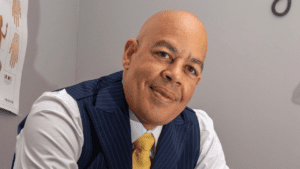From Toronto, Canada to North Minneapolis: Juneau Robbins, DC, ’96

Originally from Toronto, Canada, Robbins said that when he became interested in pursuing a career as a chiropractor, he struggled to find an English-speaking school in his native country—“My French was not that good,” he recalled.
Robbins explained he at first wanted to go into optometry, but after a basketball injury in high school, he went to see a chiropractor who was able to get him back onto the court in around six weeks. “He was a mentor for me later in high school,” Robbins said.
Upon his arrival to NWHSU, Robbins admits there was a bit of a culture shock in relocating to what he felt was a homogenous area. “I found a church home in Minneapolis quickly,” he remembers, which he attributes to helping him feel culturally settled, along with his involvement within the African American community in North Minneapolis. “I was the third black practicing chiropractor once I opened my own practice,” Robbins said of the early days of his career in the field.
Robbins currently operates two practices, but with over 25 years in the field, he recalls that he had a total of five or six at one point. He sees his current practices—both Universal Care Clinics, and Cultural Chiropractic, as “teaching type clinics” with opportunities for interns and chiropractic associates. “I see about 15 or 20 patients in a day,” Robbins says on his current operations. “It’s not a numbers game. I want to do a good job taking care of people, and what I have done, I am proud of. I’m not in a growth phase.”
He said his biggest challenge within the community he works with is the “allopathic mindset.” “Everyone wants to take a pill for everything,” he explained, adding that in 26 years, his more holistic approach is more accepted than it was 20 years ago, but that it is still difficult to teach preventative care for a condition like high blood pressure, and to encourage his patients to adopt a healthier lifestyle.
“The power that made the body can heal the body,” Robbins stated. “People take painkillers or medications, which mask what the body can do. Chiropractic gets to the root cause and makes corrections going forward.”